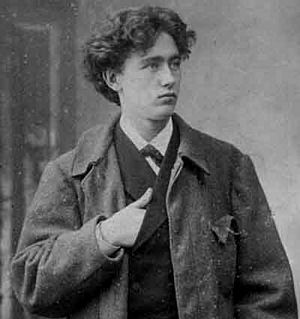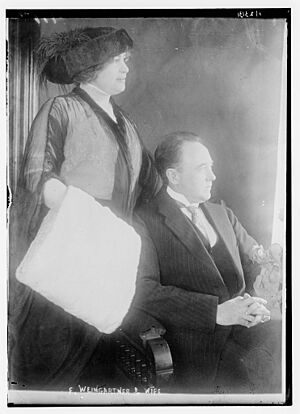Felix Weingartner facts for kids
Paul Felix Weingartner, also known as Edler von Münzberg, was a famous Austrian musician. He was born on June 2, 1863, and passed away on May 7, 1942. He was a very talented conductor, composer, and pianist.
Life and career
Felix Weingartner was born in Zara, which is now Zadar, Croatia. His family moved to Graz, Austria, in 1868. He studied music with Wilhelm Mayer. Later, in 1883, he became one of Franz Liszt's last students in Weimar. Liszt even helped with the first performance of Weingartner's opera, Sakuntala, in 1884.
Weingartner started his career as a conductor. He led operas in Königsberg and Danzig. He also worked in Hamburg and Mannheim. In 1891, he became the Kapellmeister (music director) of the Royal Opera in Berlin. He also conducted symphony concerts there.
A big moment in his career was in 1902. He conducted all nine of Beethoven's symphonies at the Mainz Festival. From 1907 to 1910, he was the director of the Vienna Hofoper. He took over from the famous Gustav Mahler. He also led the Vienna Philharmonic orchestra until 1927.
Weingartner traveled a lot for his music. He conducted in the United States for the Boston Opera Company. He also worked in Budapest and Basel. He made many important recordings of symphonies by Beethoven and Johannes Brahms. He was the first conductor to record all nine Beethoven symphonies. He was also the second to record all four Brahms symphonies.
His conducting style was very clear and precise. He liked to play music exactly as it was written. This was different from some conductors who changed tempos more freely. He taught conducting to many students, including Josef Krips. Felix Weingartner gave his last concert in London in 1940. He died two years later in Switzerland. He was married five times during his life.
Composer and editor
Even though he was a famous conductor, Weingartner also saw himself as a very important composer. He wrote many operas and seven symphonies. All of his symphonies have been recorded. He also composed a sinfonietta, a violin concerto, and a cello concerto.
His other works include orchestral pieces and string quartets. He wrote many songs for voice and piano, called Lieder. One of his most famous short works is "Liebesfeier."
Weingartner's music style mixed late Romanticism with early Modernism. His music is often compared to composers like Richard Strauss and Gustav Mahler. The composer Erich Wolfgang Korngold dedicated his Sinfonietta to Weingartner. Weingartner conducted its first performance.
Besides composing, Weingartner also edited many musical works. He helped edit the complete works of Hector Berlioz. He also edited operas by Étienne Méhul and Carl Maria von Weber. He created orchestral versions of piano pieces. These included Beethoven's Hammerklavier Sonata. He also arranged works by other early Romantic composers for orchestras.
Writings and interests
Weingartner was interested in different subjects. These included the occult, astrology, and Eastern mysticism. These interests influenced his personal ideas and some of his music.
He was also a writer. He published a play called Golgotha in 1908. He wrote many books and essays about music. He wrote about conducting and the history of the symphony. He also wrote about the symphonies of Beethoven, Schubert, and Schumann. His autobiography, Lebenserinnerungen, was published in 1923.
See also
 In Spanish: Felix von Weingartner para niños
In Spanish: Felix von Weingartner para niños
 | Calvin Brent |
 | Walter T. Bailey |
 | Martha Cassell Thompson |
 | Alberta Jeannette Cassell |



